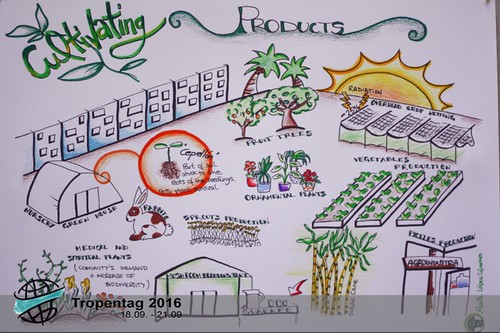Reply to comment
Urban agriculture for more resilience in food security
Tue, 09/20/2016 - 15:09 — BergerDo you know the image of Fidel Castro "smoking" a carrot with the caption „organic by default“? This is pretty much the case of Cuban urban farming practices. When the Soviet block collapsed, farmers were forced to turn to sustainable practices due to a lack of external energy-intensive inputs. At the same time, cities had a need for locally produced food. Today, the city of Havana produces 80 percent of its fruit and vegetable demand within the town borders!
The following picture shows a project by Marta Lopéz Cifuentes, student at BOKU, which is displayed in the registration area.

Today, several events at the Tropentag covered the topic of urban agriculture as a means of enhancing food security (and maybe food sovereignty, too). Cuba is a showcase of urban agriculture, since it has relied on it for several decades already. The government has supported urban agriculture in order to become more independent from imports while farmers appreciated their independence from the state. Surprisingly, despite these two contradictory objectives, policies helped urban producers get access to land, markets and extension services, as the research of Friedrich Leitgeb showed.
In an oral presentation, Michael Kirya presented urban agriculture activities in Kampala, Uganda. The Kampala Capital City Council has identified urban agriculture as a sector of sustainable urban development. Their objective is to meet several challenges: a high urban growth rate of 5 percent due to migration, as well as a severe youth unemployment rate of 88 percent. The initiators believe that they can create employment through stimulating urban-agriculture-connected-enterprises, that they can reduce waste through recycling and, most definitely, that they can establish a supply of fresh produce. Moreover, urban households can save on food expenditures (which make up more than 50 percent of their income expenses) through growing vegetables themselves. The City Council has launched an astonishing range of activities: among the others, training programmes on organic practices, extension services, and demonstration plots. Through this, they were able to instruct 450 “trainers as trainers” reaching more than 6750 potential farmers. Today, there is not only crop production, but also livestock like pigs being kept.
Yet, there are challenges to deal with. Due to the high rate of urban growth, pressure on land is increasing. Pests and diseases make it difficult to improve the productivity of the organic small scale projects. And, unfortunately, the unemployed youth is reluctant to get involved with farming. Even though the vegetables are produced within the city, farmers lack the infrastructure to bring their produce to the consumer at a good price. It is astonishing to hear there is a market for certified organic produce in Kampala - the reason why the city council plans a group certification for the urban farmers. They are even considering the use of information technology to better link production to market demand as well as to improve the traceability of goods along the value chain in order to meet supermarket standards. Moreover, the city council aims at opening a bulking and processing centre in a public-private-partnership. Possibly, the cooperative structure of the organisation in Cuba can be an inspiration to the Kampala urban farmers in order to institutionalise the farmer´s share in adding value to their produce.
Urban farming is definitely a way of increasing a city´s food security, as well as overcoming the high dependency of urbanised regions in their rural surroundings. A higher level of resilience is likely to be reached - being a role model for highly industrialised regions, which are reliant on fossil fuels. When Cuba experienced it´s shortage of fossil fuels due to political reasons, it probably already got to know what the western civilisations are still about to experience: life with a diminishing availability of fossil fuels.



